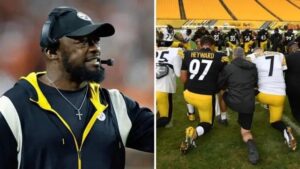
The NFL has always been a stage for not only breathtaking games but also a place where cultural and political statements have found a home. Perhaps no issue has been as contentious and divisive in recent years as the protests during the national anthem. At the forefront of this discussion is Pittsburgh Steelers’ Head Coach, Mike Tomlin, who has recently warned that he may fire players who kneel during the national anthem. This decision has ignited conversations across the nation, prompting fans, critics, and fellow athletes to weigh in
The act of kneeling during the national anthem was popularized by former San Francisco 49ers quarterback Colin Kaepernick in 2016 as a way to protest racial inequality and police brutality in America. It became a movement that divided opinions sharply.
For some, kneeling represents a peaceful and respectful way to draw attention to critical social issues. Others see it as a sign of disrespect towards the country and those who have fought for its freedom. Mike Tomlin’s announcement comes down firmly on the latter side, sparking debates over the roles of athletes in political activism, freedom of speech, and the very values that America stands for.
Mike Tomlin has always been known as a disciplined coach who maintains a strong command over his locker room. His recent statement was clear and unequivocal:
“Everyone has a right to their opinion, but when you wear the Steelers’ uniform, you represent our team and our city, and you must respect our flag and what it stands for. If anyone decides to kneel, they will face consequences, including possible termination.”
The warning is bold and in contrast to other teams and coaches who have either supported or tolerated the act of kneeling. Tomlin’s approach seems to aim at maintaining a unified team spirit and focusing on the game, rather than being dragged into political arguments.
Tomlin’s statement has, expectedly, provoked strong reactions from both sides. Many fans have praised him for taking a strong stance on a matter they perceive as a clear-cut issue of patriotism. Others have expressed disappointment, citing a disregard for the underlying social issues that prompted the protests in the first place.
Players, too, have been divided. Some Steelers have publicly backed their coach, while others have expressed concerns privately. The broader NFL community has also weighed in, with some players and coaches supporting Tomlin’s right to manage his team as he sees fit, and others decrying what they see as an infringement on players’ rights to express themselves.
Beyond the emotional responses, Tomlin’s warning raises essential questions about employment law and ethical considerations within professional sports. Can an employer in the NFL legally fire an employee for a peaceful protest? What does this decision mean for the relationship between team owners, coaches, and players?
The NFL’s collective bargaining agreement and individual contracts will play a crucial role in any legal disputes that may arise from this. However, the court of public opinion is also a powerful factor, and the Steelers and the NFL at large will have to navigate this complex issue carefully.
Mike Tomlin’s warning to fire players who kneel during the national anthem is far more than a statement about a football team’s internal policy. It is a reflection of the broader and deeply polarized views on patriotism, free speech, and social justice within the United States.
The issue transcends sport and delves into the core of what it means to be an American, balancing respect for symbols and traditions with the right to protest and demand change. Tomlin’s stance has ensured that the conversation will continue, not just in the locker rooms and stadiums but in homes, schools, and workplaces across the nation. The coming NFL season will undoubtedly be a stage where these debates play out, both on and off the field, as America grapples with its core values and the rights and responsibilities of its citizens.



